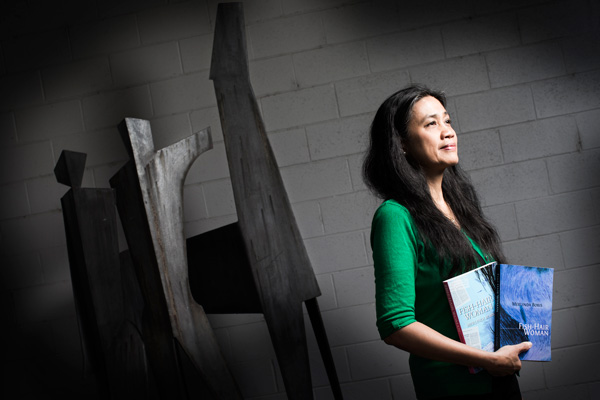November 26, 2014
Creative writing lecturer wins Philippine National Book Award
Fish-Hair Woman, the third novel by creative writing lecturer Merlinda Bobis, has won the prestigious Philippine National Book Award (Juan C. Laya Prize) for Best Novel in a Foreign Language (English).

Merlinda Bobis, author of the Fish-Hair Woman, is a creative writing lecturer at UOW
The book explores the struggles people endure amidst a total war, economic inequality and political unease in Ms Bobis’s native country, the Philippines.
Given by the National Book Development Board (NBDB) and the Manila Critics Circle (MCC), the award is a testament to Ms Bobis’s dedication to telling this story on which she spent 17 years researching and writing.
“Writing Fish-Hair Woman was, in a way, my homecoming to the Philippines and Bikol. And this award is my first home welcoming me back, assuring me that I still have a place in its heart. This award means the world to me.”
The novel was published in 2012 by Spinifex Press Australia then by Anvil Publishing, Manila. A 2012 review of the book by literary critic Ed Wright for The Australian newspaper said: “Fish-Hair Woman is a superb novel ... Written in beautifully lush, yet sharply focused language this tour de force is a tragic tale of a family destroyed during the ‘total war’ ... Balancing the evocation of the fecund world being fought over is an angry rigour. The story never defects to the easy resolution but maintains its tragic intensity throughout.”
In 2013, the Spinifex Press edition won the Most Underrated Book Award in Melbourne.
Ms Bobis, who initially came to Australia in 1991 to pursue a Doctorate in Creative Writing at the University of Wollongong, says a desire to preserve the past and explore the ethics of being human motivated her to write the book.
“This is the story of my first home, the region Bikol, including my grandmother's village, which was militarised during the 1987-1989 total war and this story must not disappear,” Ms Bobis said.
“I want to ask the difficult questions about war, loss and human nature. 'Fish-Hair Woman' shows how loss and grief impact people, it’s about 'transnational empathy' between the Philippines and Australia, and how we experience each other's suffering.”
Though steeped in fact, the story is told using myth, magic and fictional characters.
“The 12-metre hair of the Fish-Hair Woman is a metaphor for memory. In the novel, the Fish-Hair Woman’s hair is used as a net to trawl corpses from a river in the militarised village of Iraya. The act of ‘fishing out' these victims of war is ultimately a retrieval of personal stories and history, a way of remembering individuals and communities who are often lost and forgotten amidst the big political upheavals like a war."
Ms Bobis is now working on her next book, a political fairy tale about the movement of peoples caused by climate change, globalisation and conflict.
“It is also a simple story of endurance and friendship between two girls,” she said, adding that she is developing two other book projects.
“One is a collection of stories on typhoons, cyclones and hurricanes in various countries in the Asia-Pacific region. The other is a collection of poems threading together landscapes in the US, Australia, and the Philippines. I was a poet before I was a novelist, so I’m returning to my original muse, so to speak.”